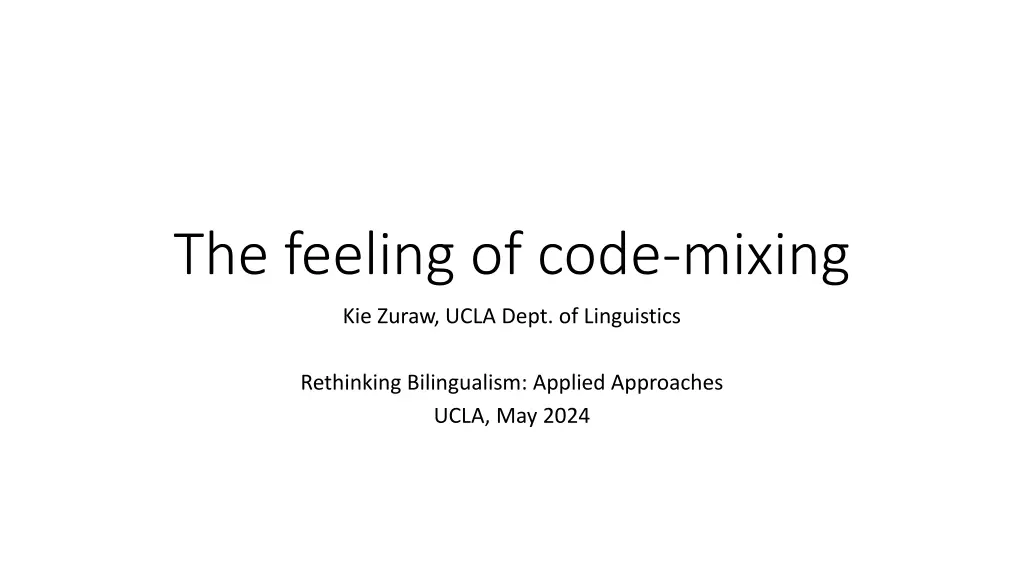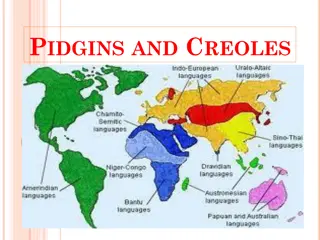
Understanding Code-Mixing and Bilingual Expression
Explore the intriguing concept of code-mixing in bilingual communication through examples from French-language forums. Discover how bilinguals convey extra meaning by using words from different languages and delve into the nuances of predictable versus unpredictable words.
Download Presentation

Please find below an Image/Link to download the presentation.
The content on the website is provided AS IS for your information and personal use only. It may not be sold, licensed, or shared on other websites without obtaining consent from the author. If you encounter any issues during the download, it is possible that the publisher has removed the file from their server.
You are allowed to download the files provided on this website for personal or commercial use, subject to the condition that they are used lawfully. All files are the property of their respective owners.
The content on the website is provided AS IS for your information and personal use only. It may not be sold, licensed, or shared on other websites without obtaining consent from the author.
E N D
Presentation Transcript
The feeling of code-mixing Kie Zuraw, UCLA Dept. of Linguistics Rethinking Bilingualism: Applied Approaches UCLA, May 2024
a me prend mon Ficello I need my string cheese @#%! M entends-tu? , episode STOP STOP STOP , Karine, played by Pascale Renaud-H bert
a me prend mon Ficello I need my string cheese @#%! pour me starter ma journ e ! to start my day start-er [st t-e] start-infinitive start = commencer
starter commencer starter start starterconnotes Starting with a special infusion of energy needed to start starting in the right way Somewhat similar to English start off, start up, get started French d marrer
Some examples found on French-language (Canadian) internet forums Going to a party to starter your weekend Viens te starter le weekend avec nous! Starter a fantasy hockey league, with an emphasis on the effort required mettons, je veux me starter ma ligue pi je me sert de ton beta, quand tu va le fermer je vais tout perdre ? An obstetrician will give medication to starter (induce) labor mais a cause du diabete ma doc va (d pendamment de mon col) me starter le 9 au soir pour que jaccouche le 10 f vrier Variety of meanings even if starter is partly conventionalized, individuals are still deciding what meanings to give it
starter start starter commencer When bilinguals use a word from a different language, sometimes they re using their resources to convey extra meaning How does this work? How did starter get this extra meaning? Proposal I: Because of their feeling of surprisingness, switched words can carry extra meaning
Predictable vs. unpredictable words If you have any problems, just give me a ___ Easy to predict Auto-complete on your computer or phone will probably suggest the right word call If he has any problems, just give him a ___ Hard to predict Even if you know the context Auto-complete will probably not suggest anything nap? snack? user manual? reminder?
An illuminating experiment Mysl n & Levy 2015 took a corpus of conversations among Czech- English bilinguals and compared sentences like A pot ebujeentertainment And she needs entertainment Ona se na tebe bude lepit She will cling to you Czech has a word for entertainment, so why use the English word here? They hypothesized that a switch is more likely when a word is unpredictable, unexpected The switch alerts the listener to pay more attention Caveat: There are many, many reasons for a switch to happen! They wanted to know if there was still an effect of unpredictability on top of all the other reasons
How to measure unpredictability? Participant has to guess what word the beeeep obscures, and type it A pot ebujebeeeep Unpredictability = % of participants who couldn t get the word in 6 guesses (translation equivalent counts as correct)
Mysln & Levys result After controlling for many other factors, the words that speakers in the original conversations had chosen to switch into English were more unpredictable (harder to guess) Their interpretation: Consciously or not, the speaker is using the language switch to signal the listener to pay more attention This will help the listener prepare for the unexpected word www.alldogsunleashed.com/wp-content/uploads/2019/09/shutterstock_1122150491.jpg
But wait, how can a listener prepare to pay more attention, if the word has already started? Early in the word, the English vowel and consonant sounds will sound different from Czech A pot ebujeentertainment And she needs entertainment But the listener can also get some clues even before the word begins Piccinini & Garellek (2014), Olson (2016): the rhythm and melody of the sentence ( intonation ) changes leading up to the switch Partly this is inevitable, because the two languages have different intonation systems But it can also serve to alert the listener that a switch is coming up By the way, we do this kind of signaling in single-language sentences too: We ll have to do a lot of {like/you know/shall we say/pause} contortions All these hesitations warn the listener that an unexpected word is coming up
Aside: does code-switching always work this way? Mysl n & Levy point out: using a language switch to signal upredictability works only if code-switching is itself at least slightly surprising In a community where it s typical for a sentence to contain multiple switches, this might not work A Spanish/English example from New York City (reported by Poplack 1988): But I used to eat the bofe, the brain. And then they stopped selling it because ten an, este, le encontraron que ten a worms. I used to make some bofe! Despu s yo hac a uno d esos concoctions: the garlic con cebolla, y hac a un mojo, y yo dejaba que se curare eso for a couple of hours.
Back to starter Now, what happens if a switch signals you that the word is unexpected, but it s actually a rather plain, predictable word like start? pour me starter ma journ e Then the listener has to read between the lines. We do this all the time! My boss was on time today reading between the lines, the speaker s boss must often be late (otherwise, why would they have said this? This is Gricean Implicature, for the linguistics students here)
Back to starter Another example of reading between the lines Unlike in the contortions example, interesting is not a surprising or infrequent word here: It was interesting It was, well, interesting It was (high pitch at end of was) interesting Reading between the lines, it was actually terrible, or shocking, or something else more than just interesting When a person says something in an atypical way, the person they re talking to infers that there must be an atypical meaning involved (Rett 2020, Levinson 2024)
Back to starter How this applies to pour me starter ma journ e 1. By switching to English, the speaker tells us that start carries a lot of information 2. Reading between the lines, we guess they must mean not just start but something more 3. Context and general knowledge (e.g, about why people eat breakfast) help us guess that they mean start in the right way, requiring an infusion of energy
Besides the feeling of surprisingness, a switched word can also carry a feeling of separation from the word before, with some interesting linguistic consequences
Word structure Starter: well integrated into French word structure, getting the infinitive suffix er start past participle startais imperfect starterai 1st singular future startera 3rd singular future starteront 3rd plural future etc.
Word structure But this doesn t always happen In France, verbs from another language often resist getting any suffixes Si tu veux me follow sur Instagram If you want to follow me on Instagram In Canadian French (and for many in France too), this would be follower (infinitive) Similarly for some loans from Romani (poucave, p nave), Arabic (khalass, nehess) and Occitan (marida) Proposal II: Switched words can have special word structure ( morphology ), as a way to set them apart from the rest of the sentence
Intentionally funny Reddit post (by a Canadian) Il est de plus en plus fr quent d'entendre des aberrations comme "T'as-tu spot la fille l bas?!" dans les rues du Qu bec. La r gle est pourtant simple: en franglais qu b cois, tous les verbes anglais se conjuguent comme des verbes fran ais du premier groupe. L'usage correct est donc "T'as-tu spott la fille l bas?!" I don t know about the original poster, but certainly some of the commenters are genuinely annoyed by this development, perceived as influence from France (my translations): When a hear a tech tell me he s reboot the processer I lose it it s reboot , you ve REBOOT the processer It s more and more frequent to hear aberrations like T'as-tu spot la fille l bas?! [Didja spot the girl there] in the streets of Quebec. The rule is simple, though: in Qu b cois Franglais, all the English verbs are conjugated like French first-conjugation verbs. The correct usage is therefore "T'as-tu spott la fille l bas?!" I know you were just trashposting, but it annoys me non-ironically [This] unleashes an emotional reaction. I don t care about daron or wesh [slang words from France]. But make your verbs agree, like a civilized person, dammit! This kind of sentence makes the hair on my arms stand up Continues in the style of a language-purist newspaper editorial www.reddit.com/r/Quebec/comments/11epgm3/rappel_la_conju gaison_du_franglais_qu%C3%A9b%C3%A9cois/
French verbs that dont take any suffixes The thing is, in France, it s not such a new development, and it s not just for loanwords. Shortenings: pr co to pre-order (from pr commander) Initialisms: RT to retweet And a kind of slang called verlan that re-orders sounds from the original word: ou j to play (from jouer), golri to laugh, be amused (from rigoler) By the way verlan nouns can also opt out of the French plural system by adding a suffix, but I ll leave that for another day Not putting verb suffixes on these special words serves to set them apart from the rest of the sentence Is this for the listener s/reader s benefit? E.g., telling them to pay more attention? Or a product of the speaker s/writer s feeling that the word is special? I won t offer an answer, but..
Code-switched words, loans, abbreviations, initialisms, verlan and other slang All feel a bit separate from the rest of the sentence In English too, suffixes on these kinds of words may be avoided or set off with special punctuation Several chaebol were implicated in the scandal All the department admin s were there They OK d the deal
Code-switched words, loans, abbreviations, initialisms, verlan and other slang All are likely to be written with quotation marks or italics, or spoken with an air quotes gesture Quotation marks and italics call attention to a word s form instead of just its (usual) meaning Distance the speaker/writer from the material Delegitimizing: His contributions to the meeting were mostly just complaints Direct quotation: She said she was devastated by the news Talk about a word Consider the difference between cat and kitty Onomatopoeia The shoes made a slip-slop sound Signal unexpectedness/newness Harmonic grammars use constraint weighting instead of strict ranking Add emphasis or enthusiasm, though this is stigmatized for quotation marks (not stigmatized for italics) Fresh tomatoes! If you know Japanese, notice the overlap with uses of katakana
By the way, when are loans italicized and when not? I ll show you a restaurant review from the New Yorker magazine it s one of the few English-language periodicals left that has the resources to do serious fact-checking and copy-editing So I m assuming that these choices are not random but rather reflect some kind of in-house style manual
A bowl of ayacote beans, firm-fleshed with satiny insides [ ] Duck enmoladas are pure, melting intensity: long- braised dark-meat carnitas in a black-garlic mole, wrapped in a chewy tortilla made from amaranth. It s blanketed by an opaque white layer of what the menu calls cotija foam, which is actually more like an airy sauce mornay, salty and rich. The menu is laced with obscure regional ingredients such as chintixtle, a Oaxacan paste made from dried chilis and dried shrimp, or chicatanas, crisp flying ants that taste like salt and smoke. This makes Caballero s more obvious moves feel, well, obvious: a blue-corn quesadilla made with asadero cheese somewhat gratuitously pairs huitlacoche a naturally occurring corn fungus sometimes called Mexican truffles with shaved actual truffle. Cutting through all the big, rich flavors was a zingy dish of shrimp aguachile. [ ] with sultry, herby notes of shiso and Japanese cherry blossoms. Some of the food words are italicized, indicating that they re not English But others aren t I guess the New Yorker editors consider these words as English now? www.newyorker.com/culture/the-food-scene/mexican-ish-fine-dining-with-detours-corima
A bowl of ayacote beans, firm-fleshed with satiny insides [ ] Duck enmoladas are pure, melting intensity: long- braised dark-meat carnitas in a black-garlic mole, wrapped in a chewy tortilla made from amaranth. It s blanketed by an opaque white layer of what the menu calls cotija foam, which is actually more like an airy sauce mornay, salty and rich. The menu is laced with obscure regional ingredients such as chintixtle, a Oaxacan paste made from dried chilis and dried shrimp, or chicatanas, crisp flying ants that taste like salt and smoke. This makes Caballero s more obvious moves feel, well, obvious: a blue-corn quesadilla made with asadero cheese somewhat gratuitously pairs huitlacoche a naturally occurring corn fungus sometimes called Mexican truffles with shaved actual truffle. Cutting through all the big, rich flavors was a zingy dish of shrimp aguachile. [ ] with sultry, herby notes of shiso and Japanese cherry blossoms. Some of the food words are italicized, indicating that they re not ordinary English But others aren t I guess the New Yorker editors consider these words as ordinary English now? I imagine the writer and the copy-editor debating this, since a word s ordinariness depends on each writer or reader s experiences
How about pronunciation? We ve now seen that avoiding the usual verb suffixes, etc., helps special words, including code-switched words, retain their distinctness Which may help them have their desired rhetorical effect Code-switched words can also be set apart in their pronunciation We ve already touched on intonation: the rhythm and melody of a sentence can change in the lead-up to a switch But there s more
Katsuda, Repiso-Puigdelliura & Zuraw an experiment we ve presented at a couple of conferences but not published yet He s got great asparagus Because the t is between two vowels, the sound structure of English says that it can optionally get pronounced as a tap sound, similar to Spanish r. d words the same way: good asparagus He s got great abejas Can the English rule still apply to this t, even though one of the vowels that s necessary to fulfill the conditions of the rule is from a Spanish word? Hiro Katsuda Gemma Repiso-Puigdelliura
Participant reads out loud and is audio- recorded Participants were UCLA students who are bilingual in Spanish and English. As it turned out, all grew up in the U.S., raised by parent(s) from Mexico and/or Central America He s got great abejas
Results The rule can apply, to both t and d, in all-English sentences and in code-mixed sentences But, it applies more often in the all-English sentences
But wait Let s look more closely It s very rare for a bilingual to have exactly the same proficiency in both languages We used a questionnaire about language history, use, and proficiency, to give each participant a number ranging from very Spanish- dominant to balanced (0) to very English-dominant: If we split the participants into two equal-sized groups, we can compare the more balanced half to the more English-dominant half
But wait The difference between all-English sentences and Code-Mixed sentences is driven by English- dominant bilinguals: They re saying go[ ] abejas a lot more than go[ ] abejas This makes sense in terms of speech planning
Speech planning In order to pronounce it go[ ] abejas when you re planning (unconsciously) how to pronounce the t of got you need to already know that the next word will start with a vowel If you haven t planned that far in advance You can pronounce it as t (rare) or a [ ] ( glottal stop ) Previous research on all-English sentences finds that people are less likely to produce the tap sound [ ] when the second word is infrequent or unpredictable rabbit ears vs. rabbit evenings (Kilbourn-Ceron & al. 2020, Kilbourn-Ceron & Goldrick 2021) Infrequent and unpredictable words take longer to retrieve from the mental dictionary
Speech planning What could this have to do with language dominance? For people who use English for more of their day and week Spanish words are effectively lower frequency Lower-frequency words take longer to access from the mental dictionary So, more English-dominant participants could be less likely to get abejas cued up fast enough to plan a tap in got
Further support for the delayed-access theory Participants read all the sentences through once ( 1st block), took a short break, then read them all again ( 2nd block) The effect is the very strongest in Block 1, when the sentences are all brand-new to the participants
Proposal III: Switching languages can produce a discontinuity in speech planning, which can cause the pronunciation of a word to also be set apart Especially, avoid processes that merge the switched word with a previous word like English tapping or French liaison/elision
Current experiment, if youre curious Four sound rules instead of just one both English and Spanish rules rules that change both the word before the switch and the word after the switch Longer sentences that change in the middle instead of at the end Administering not just the Bilingual Language Profile (Birdsong & al. 2012) but also Bilingual Code-Switching Profile (Olson 2024) MINT sprint (Gollan 2024: 3-minute vocabulary test, for both English and Spanish)
French vowel-initial words French really doesn t like a syllable to begin with a vowel sound, and sometimes there are ways to avoid it The simplest way is to delete a vowel the boy is le gar on 3 syllables, all start with consonants: le gar on the child is not *le enfant, but l enfant 2 syllables, both start with consonants: l en fant Same goes for words spelled with h, which is silent in French Not *le h ritage, but l h ri tage the heritage (There are also cases where a consonant gets inserted, or a different form of a word is used.)
French vowel-initial words But there s a set of exceptions where this doesn t happen le h risson the hedgehog le houblon the hops You mostly have to memorize these But there are types of words that you can guess will likely be exceptions Proper names: Hugo, Octave (varies) Verlan words: ouf (from fou) Initialisms: H.L.M. (varies) Mentioning a word or part of a word: le oui the yes And loanwords!: ukul l (varies) Authors have long noted that making one of these words an exception, and thus having it start its own syllable, helps to conserve its individuality (Malmberg 1943) This set of words should look familiar it overlaps a lot with the special words that tend to get put in quotes or italics, tend to avoid suffixation in French
Language switch break in pronunciation For both English tapping and French vowel-initial words, there are a number of possible mechanisms Slight delay in accessing word it s not ready in time to be planned with the preceding word Can t apply rules like the English tap rule, or French rules that move a consonant from the end of one word into the same syllable as the beginning of the next word Default speech posture = the speech-ready posture that your lips, tongue, etc. adopt before/between actually speaking varies from language to language The most proficient bilinguals have distinct default postures for each language (Wilson & Gick 2013) Switching from one posture to the other might be hard to do without a clean syllable boundary Deliberate signal to the listener pay extra attention to this unexpected word Or just keeping the unexpected word more distinct so it s easier to perceive
Emotional charge I ve talked up till now about how and why certain words are special, but their specialness hasn t carried much emotional charge. I m personally very interested in but won t have time to talk about today cases where code-switched words carry a strong emotional charge Childhood words In multilingual families, endearments, scoldings, and general childhood words may remain associated with the heritage language, even for generations that have mostly switched to the majority language These words can carry strong emotional charge for both the speaker and the hearer For obvious social and cultural reasons But maybe also because early-learned words seem to have different brain representation Possibly more diffuse Possibly more linked to sensory information (see Brysbaert & Ellis 2016 for a review)
Emotional charge Swearing There s lots of research on how swearing feels (to the swearer and the swear- ee) and why Distinctive sounds (Lev-Ari & McKay 2023) Distinctive neurolinguistics (Stephens 2018 review) Experience of inhibiting and disinhibiting these words Especially in bilinguals (e.g., Sulpizio & al. 2019) A recurrent finding which I bet will match your own experience is that swear words in a second language feel less strong
How does code-mixing make you feel? How does code-mixing make you feel? Meaning, what feelings does it give you? How does code-mixing make you feel? What are the mechanisms by which it makes you feel something? How do these feelings and mechanisms affect code-switched words linguistic properties? Switch signals unexpectedness can force listener to impute extra meaning switched words can gain additional meaning Switch can feel distinct from what came before it in the sentence special word structure Switch can disrupt speech planning avoid applying certain sound rules Something to think about: how do you and other bilinguals exploit all this to enrich your communication?





















